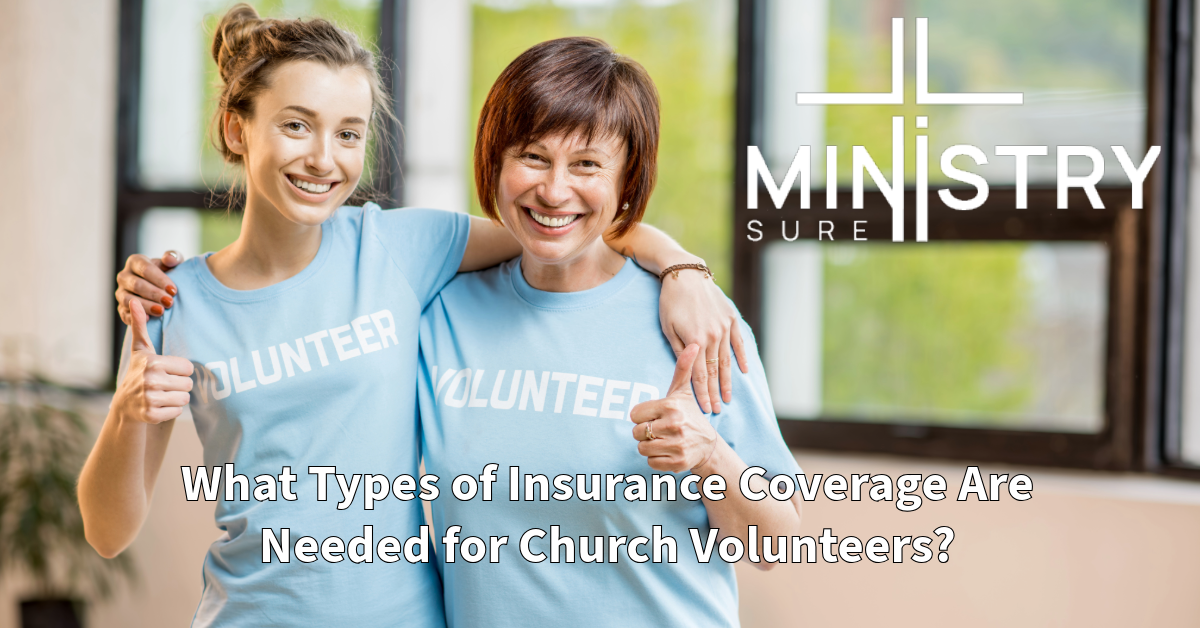When Jake agreed to volunteer as a youth mentor at his local church, he expected to spend his Saturdays coaching basketball and helping with homework. What he didn’t anticipate was an incident that would change how his church viewed volunteer safety forever. During an outdoor event, one of the teens tripped over a loose cable and suffered a minor fracture. Thankfully, the church’s insurance covered the medical bills, but the experience left the church leadership realizing they needed better protection for their volunteers. They soon discovered that having the right insurance coverage was critical—not only to safeguard volunteers like Jake but also to protect the church from unexpected financial setbacks.
The Importance of Insurance for Church Volunteers

Churches often rely heavily on volunteers, whether they’re leading youth groups, organizing community outreach, or driving members to special events. These individuals are vital to the church’s mission, but their activities also carry inherent risks. This means churches must be proactive in securing appropriate insurance coverage to protect both their volunteers and their assets. Here are the primary types of insurance churches should consider:
1. General Liability Insurance: A Safety Net for Accidents
General liability insurance is the cornerstone of any church’s insurance coverage. This policy covers the basics, like claims of bodily injury or property damage that might occur during church-sponsored events. For instance, if a volunteer accidentally knocks over an expensive piece of equipment or a guest slips on a wet floor during a church gathering, general liability insurance can help cover legal fees, medical costs, and potential settlements. This type of coverage is essential because it provides a safety net for churches when the unexpected happens.
2. Volunteer Accident Insurance: Covering Immediate Needs
To offer more focused protection, many churches choose to add volunteer accident insurance. This policy is specifically designed to cover injuries sustained by volunteers during church activities, paying for medical expenses such as hospital visits, X-rays, or rehabilitation. For instance, if a volunteer is injured while setting up for an event, this coverage can take care of the immediate costs without involving liability claims. This minimizes disruptions and ensures that volunteers receive the medical care they need promptly.
3. Professional Liability Insurance: Protecting Against Errors and Omissions
Churches often rely on volunteers for specialized tasks, like counseling, mentoring, or educational programs. If a volunteer’s advice or actions unintentionally cause harm, the church could face legal repercussions. Professional liability insurance, sometimes called Errors and Omissions (E&O) insurance, helps cover these situations. For example, if a volunteer inadvertently gives incorrect advice during a counseling session that results in emotional distress, this policy can cover legal defense fees and any settlements that may arise.
4. Abuse and Molestation Coverage: Protecting Vulnerable Populations
Though it’s a difficult topic, churches must acknowledge the risk of abuse allegations, especially when they involve children, teens, or vulnerable adults. Abuse and molestation coverage can provide the necessary protection if a claim arises. This insurance covers legal fees and settlements associated with accusations of misconduct, even if the claims are unfounded. Churches that run youth programs, daycare services, or outreach initiatives for vulnerable populations should consider this coverage as a crucial part of their risk management strategy.
For more in-depth information on why abuse coverage is necessary for organizations like churches, you can explore What is Abuse and Molestation Insurance Coverage for Foster Care Agencies?.
5. Non-Owned and Hired Auto Insurance: Protecting on the Road
Churches frequently rely on volunteers to use their personal vehicles for church-related activities, such as transporting members to a retreat or delivering food donations. However, a volunteer’s auto insurance may not provide sufficient coverage for accidents that occur during church business. This is where non-owned and hired auto insurance comes in. It offers protection for the church in case of an incident involving a volunteer’s vehicle, covering costs that go beyond the individual’s personal policy limits. This ensures that both the church and the volunteer are financially protected.
6. Cyber Liability Insurance: Addressing Digital Risks
In today’s digital age, many churches maintain databases of member information, financial records, and volunteer details. Cyber liability insurance can protect against breaches that expose sensitive data, offering coverage for data recovery, notification expenses, and even reputational damage. As more churches use online platforms for communication and event registration, the risk of cyber threats increases, making this coverage more relevant than ever.
For more information about the benefits of cyber liability insurance for churches, read Does a Foster Care Agency Need Cyber Liability Insurance?.
7. Directors and Officers Insurance: Protecting Church Leaders
Church leaders and board members often make critical decisions on behalf of their congregation. Directors and Officers (D&O) insurance provides protection for these decision-makers if they face claims of wrongful acts, including mismanagement, negligence, or discrimination. For example, if a volunteer alleges wrongful termination or claims that church leadership failed to maintain a safe environment, D&O insurance can cover legal defense and settlement costs. This coverage ensures that church leaders can continue their duties without fear of personal financial liability.
8. Mission Trip Insurance: Safeguarding Volunteers Abroad
Many churches organize mission trips, sending volunteers overseas for humanitarian or evangelistic work. In these cases, standard insurance policies may not provide adequate coverage. Mission trip insurance is designed to cover medical emergencies, accidents, trip cancellations, and even political evacuations that can occur while volunteers are working abroad. This specialized coverage ensures that volunteers can focus on their mission without worrying about unforeseen circumstances.
Jake’s Church Takes Action
After the incident with Jake, the church leadership took a closer look at their insurance needs. They consulted with an experienced insurance agent who specialized in church coverage, assessing their existing policies and identifying gaps. They added Volunteer Accident Insurance to ensure any future injuries could be quickly addressed, and they expanded their liability coverage to protect the church in a broader range of scenarios. Additionally, they included cyber liability coverage, understanding that their member databases and financial records needed to be secure.
By investing in these insurance solutions, Jake’s church demonstrated its commitment to safeguarding volunteers and reducing risk. Not only did this provide peace of mind for church leaders, but it also reassured volunteers like Jake that their contributions were valued and protected.
Why Churches Need Comprehensive Coverage for Volunteers
Churches are unique environments where volunteers engage in a variety of tasks, from hands-on construction projects to administrative duties. Each activity carries its own set of risks, making it essential for churches to tailor their insurance coverage accordingly. Here’s why every church should consider reviewing and expanding their insurance policies:
- Protecting Volunteers: Insurance coverage shows that the church values its volunteers and is prepared to support them if something goes wrong. It creates a safety net that encourages volunteer participation without the fear of financial consequences.
- Minimizing Financial Risk: Without the right coverage, a single accident or lawsuit could lead to significant financial strain for the church. By proactively addressing potential risks with appropriate insurance policies, churches can avoid costly legal battles and focus on their mission.
- Maintaining Trust: Volunteers are more likely to serve in an environment where they feel safe and protected. Adequate insurance coverage demonstrates that the church is a responsible organization that prioritizes the well-being of its members and volunteers.
For more insights on how churches can protect themselves from unexpected incidents, explore articles like:
- How Often Should My Church Review Its Insurance Coverage?
- What Types of Insurance Coverage Are Needed for Church Special Events?
MinistrySure: Supporting Churches in Building a Safer Community
At MinistrySure, we understand the unique challenges churches face in protecting their volunteers and members. We specialize in providing tailored insurance solutions that meet the diverse needs of religious organizations. Our team works with insurers experienced in church coverage to ensure you have the right policies in place, whether you need liability protection, cyber insurance, or mission trip coverage. Let MinistrySure help you focus on your ministry while we handle the complexities of insurance, so you can serve your community with confidence and peace of mind.
For more details on how we can support your church’s insurance needs, contact MinistrySure today, and ensure that your volunteers are safe, protected, and empowered to serve.






